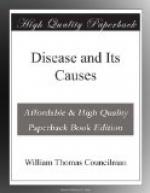measures both of prevention and cure can be and are
carried out by the well-to-do, but the disease must
remain where there are the conditions of the slums.
Of all the conditions favoring infant mortality poverty
comes first. In Erfurt, a small city of Germany,
of one thousand infants born in each of the different
classes, there died of the illegitimate children three
hundren and fifty-two; of those of the laboring class,
three hundred and five; of those in the medium station
(official class largely), one hundred and seventy-three;
of those in higher station, eighty-nine. The
same relation of infant mortality to poverty becomes
apparent when estimated in other ways. In Berlin,
with an average infant mortality of one hundred and
ninety-six per thousand, the deaths in the best districts
of the city were fifty-two and in the poorer quarters
four hundred and twenty. The effect of poverty
is seen particularly in the bottle-fed infants; with
natural nursing the child of poverty has almost as
good a chance as the child of wealth. From reasons
which are almost self-evident, the mortality in illegitimate
infants is almost double that of the legitimate.
The greater infant mortality in poverty is due to
the more numerous children preventing individual care,
the separation of the mother from the nursing child
in consequence of the demand made upon her earning
capacity, and the decline in breast nursing. Wealth
is on the whole more advantageous from the narrow
point of view of disease than is poverty, but if we
regard its influence on the race its advantages are
not so evident. Nothing can be worse for a race
than that it should die out, and wealthy families
have never reproduced themselves. Conditions
always tending to destruction are a necessary part
of the environment of poverty; wealth voluntarily
creates these conditions, and chiefly by the pernicious
influence of its amusements on the young.
A new and in many respects a nobler conception of
medicine has been developed. Formerly medical
practice was almost exclusively a personal service
to the sick individual, and measures looking toward
the general relief of disease and its prevention received
scanty consideration. The idea of a wider service
to the city, to the state, to the nation, to humanity
rather than the personal service to the individual,
is becoming dominant in medicine. This is seen
in the establishment of laboratories by boards of
health in cities and states in which knowledge obtained
by exact investigations can be made of direct service
to the people; in the medical inspection of schools
and factories; in promulgating laws directed against
conditions which affect health, in the extension of
hospitals, and in divers other ways. The idea
of public service and of returning to the people in
an effective way some of the results of their labor
also underlies the large donations which have been
given for the creation of special laboratories and
institutes in which, through research, greater knowledge
of disease may be obtained and made available.
The researches which have been made on the nutrition
of man and the nutritive value of different foods
are of great importance, and this knowledge has not
yet begun to be applied as it should be.




